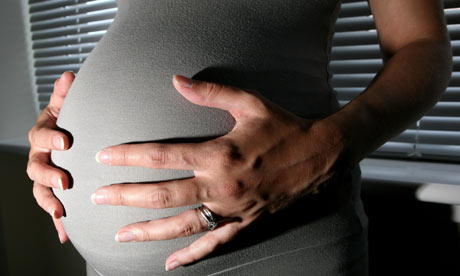
Expectant mothers with high blood pressure should be induced at 37 weeks, according to research published today that could change medical practice.
Researchers in the Netherlands found that women with high blood pressure or mild pre-eclampsia who were induced three weeks before their due date had nearly 30% less chance of developing further complications than those who were not. The Royal College of Obstetricians and Gynaecologists said the findings could bring back the days of advising more women to opt for induced births.
The study, to be published in the Lancet, was carried out by Dr Corine Koopmans, of University Medical Centre Groningen, in the Netherlands, where hypertensive disorders such as gestational hypertension (high blood pressure) and mild pre-eclampsia are the primary cause of maternal death.
Researchers looked at 758 pregnant women with high blood pressure or mild pre-eclampsia. They found that 31% of those who were induced developed birth complications, compared with 44% among women whose condition was monitored until delivery.
"Our findings that induction of labour was associated with a reduced risk of severe hypertension, and subsequent reduced need for caesarean section, emphasise the importance of frequent blood pressure monitoring during the concluding weeks of pregnancy," said Koopmans.
"We believe that induction of labour should be advised for women with gestational hypertension … or mild pre-eclampsia at a gestational age beyond 37 weeks."
The researchers said they were surprised to find that fewer caesarean sections were needed in the induction group than in the monitoring group.
Professor James Walker, spokesman for the Royal College, said expectant mothers in Britain were often resistant to induction. "This is going to create a lot of discussion. It will change practices. If you look at management of people with high blood pressure, 20 years ago induction was quite common. Then there was a move towards more conservative management. This has shown that early induction does not increase complications and may reduce them. It will open up the discussions and choices between carers and expectant mothers."
Walker said expectant mothers might find it harder to achieve a natural birth. "There will be concerns that it will be used by doctors to encourage people to be induced when it is not necessary or when they do not want to be," he said. About 6%-8% of pregnancies, or up to 56,000 cases a year in Britain, are complicated by hypertensive disorders.
Janet Pyle, professional policy adviser at the Royal College of Midwives, said: "You have to be conscious of the woman. It is their pregnancy. You cannot just have a blanket policy and say to the woman: 'We think you should be induced at this time'."
Dr Donna Johnson at the Medical University of South Carolina said the research was relevant as it included a series of less serious pregnancy outcomes. "Severe hypertension and use of antihypertensive drugs were less common in the group of patients who had induction of labour. Thus, this group had a lower probability of developing complications associated with severe hypertension.
"Therefore, it is reasonable to treat mild hypertensive disease definitively with delivery rather than allow pregnancy to progress and blood pressure to increase if maternal caesarean section rate and neonatal morbidity are indeed unchanged."
Pre-eclampsia is a condition where pregnant women develop high blood pressure together with protein in their urine that is leaked from their kidneys. It can cause complications, for example growth problems in the baby. It can also lead to eclampsia, a type of life-threatening seizure. Every year in the UK, pre-eclampsia is responsible for the deaths of seven to 10 mothers and up to as many as 1,000 babies, according to the Department of Health.
A Department of Health spokesperson said: "Nice [National Institute for Clinical Excellence] guidelines make clear that induction of labour is appropriate when health professionals agree that the foetus or mother will benefit from a higher probability of a healthy outcome than if the birth is delayed. There are a number of reasons why induction may be offered and recommended, including if the mother has pre-eclampsia.
"Clinicians should fully discuss and agree the treatment options with the mother before any decision is reached, including explaining the procedures and care that will be involved and any risk to the mother or baby."

